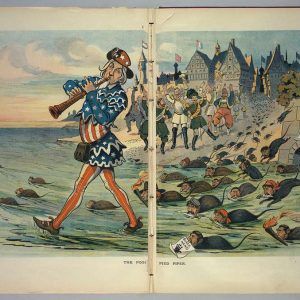It’s the 1st of April, and while for many of us this is an ordinary day, calendars tell us otherwise. It’s Fools’ Day.
I’ll go straight for the jugular— Karate-style, and ask this question. Considering we are in the electioneering year— are you a *bleeping* fool or not?
But first, a story for you.
Once upon a time…
A medieval German legend of “The Pied Piper” is told. It has survived for a long time, given it dates back to the Middle Ages. It goes something like this…
A long, long time ago in the town of Hamelin, Lower Saxony, Germany, an army of unforgiving rats invaded and overran Hamelin. It was a disaster. The citizens did all in their power to purge their beloved town of the rodents, but their efforts were pummeled by an increase in the rats. The more the citizens tried, the more the rats increased. It’s safe to say that Hamelin town’s situation went to hell in a handbasket.
The citizens implored their Mayor to do something about it.
“Don’t just sit there on your hands and watch rodents rule and ridicule us, Mayor! Do something!” I imagine them saying. The Mayor soon enlisted the help of a mysterious rat-catcher, a man whose name was unknown. His innate gift and talent was in playing a magical pipe whose tune lured rats and then led the rodents to the river where they drowned. The Mayor requested this mysterious man to trade in his talent and save their town.
“All I ask for to play my magical pipe and rid your town of the rats is money,” the man said.
“Do not worry! The citizens will each contribute and pay you after the job is done,” replied the Mayor.
The man came to be known as The Pied Piper. “Pied” because he wore multi-coloured clothes, and “Piper” because he played the pipe. Off to work went the Piped Piper. He breathed into his magical pipe and a sweet tune hovered throughout the town of Hamelin. His music lured the rats, and the rodents followed him. He led them to a river where they all drowned.
When he asked for his payment, however, the citizens refused to pay what was owed to him. In anger and retaliation, the Pied Piper once again played his pipe, this time a different but equally sweet tune that lured the children of that town. These children followed the Pied Piper, and that was the last time they were ever seen. The Pied Piper exacted his revenge on the promise-reneging citizens of Hamelin.
The English phrase “to pay the piper” and the English meaning of "Pied Piper"
Now, let’s learn some English before we determine whether you are a fool or not.
Inspired by this story, Englishmen came up with the phrase “to pay the piper” to mean “to suffer consequences for an action or for something you did wrongly”. They also came up with the noun “Pied Piper” which means “someone who other people follow or support but who may harm them or leave them disappointed”.
2022, Kenya’s electioneering year
Is the leader you think of voting for a good leader? Will he/she lead our country to prosperity or will he/she be a Pied Piper, lure us with their sweet tune, and lead us to destruction?
Will you vote wisely, or are you a fool?
Happy Fools Day, and while at it, read this article by Ron Barasa, where he lists the types of voters we have in Kenya based on their thought processes.
A poem by Robert Browning popularising the medieval German legend of The Pied Piper
“And I chiefly use my charm
On creatures that do people harm,
The mole and toad and newt and viper;
And people call me the Pied Piper!”





